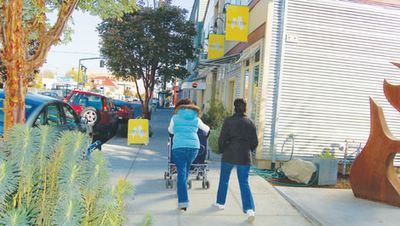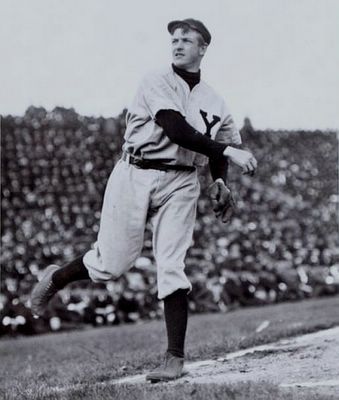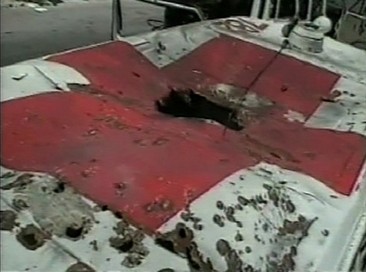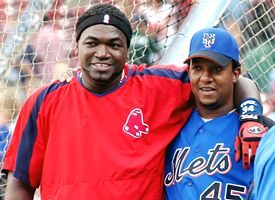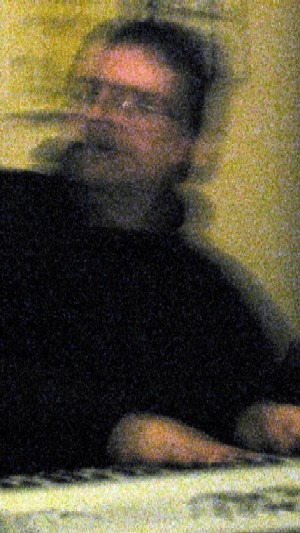23 December 2006
The other 4 from '6
Roots & Crowns
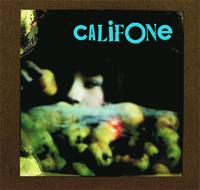 A while back, a friend of mine told me about this band Califone he saw opening a show for Wilco. "They were the best band of the night".
A while back, a friend of mine told me about this band Califone he saw opening a show for Wilco. "They were the best band of the night".Having a hard time grappling with that, I bought this record and...wow.
Ships

This mere fact speaks volumes.
Howe Gelb
'Sno Angel Like You
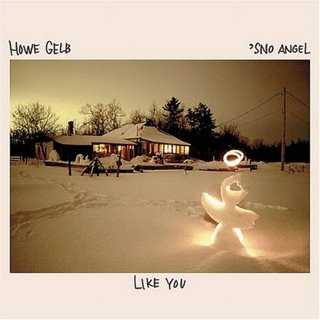 (Ex-Giant Sand) Howe Gelb's solo record:
(Ex-Giant Sand) Howe Gelb's solo record:sortof Lou Reed meets Tom Waits...or something. Nice.
Centro-Matic
Fort Recovery
 I read this internet-bit about Will Johnson meeting Will Sheff (Okkervil River) who had a Proust "Remembrance of Things Past" book tucked under his armpit at a Centro-matic show. I bought this record just because of that story. According to my I-Tunes playcount, I listened to this a lot.
I read this internet-bit about Will Johnson meeting Will Sheff (Okkervil River) who had a Proust "Remembrance of Things Past" book tucked under his armpit at a Centro-matic show. I bought this record just because of that story. According to my I-Tunes playcount, I listened to this a lot.I call this: alt.drive-by-truckers meets Neil Y.'s Crazy Horse, on steroids.
30 November 2006
zzzz...
30 October 2006
Alberta Street Racial Lines
African Americans much less happy with street
Portland State University professor Daniel Sullivan has just completed a study compiling the opinions of the changes on the street known for new residents, art galleries, restaurants and storefronts.
Among all people, there was a general sense the neighborhood is losing its diversity, especially longtime African American businesses and organizations.
Sullivan, an associate professor of sociology, evaluated responses from 88 businesses, churches and non-profit organizations on or near the thoroughfare between Northeast 11th and 30th Avenues.
He said he chose to study the street because, unlike most neighborhoods in Portland, it is racially and economically diverse.
Most disagreements over the changes on Alberta fell along racial lines.
"What really surprised me is it seems like I expected a lot more disagreement," Sullivan said. "It seems most people like what's going on, except African Americans."
He found that many white respondents embrace the idea of diversity, but feel nothing can be done about it. Some even lament the fact that few of their clientele are African American.
"Many of us here would love to keep the multicultural element," said one artist surveyed, "but it's controlled by economic forces."
A concern for 60 percent of respondents was affordability. Renters and art studio operators feel the most vulnerable to displacement, regardless of race.
Black respondents tended to believe that there are more problems on Alberta than do other races. For example, 64 percent of black respondents state that "police not caring" is a problem, compared to only 28 percent of other respondents. Seventy-nine percent of blacks surveyed see racial tensions in the neighborhood as a problem, compared to only 45 percent of those questioned from other races.
Although most respondents liked the Last Thursday art walks, African Americans were half as likely to view it positively.
Sullivan is careful to say his study was not an effort to promote particular change, but rather an attempt to reduce biases among businesses and organizations of different ethnicities, many of which he found do not communicate with each other. He stresses the importance of discussion among everyone with a stake in the neighborhood, and offers a few practical suggestions to preserve and enhance racial diversity along Alberta, including hiring a racially diverse staff from the neighborhood, offering products and prices that attract a range of residents and advertising in diverse venues.
Another less obvious suggestion concerns dogs in gentrifying neighborhoods - Sullivan found some respondents are uncomfortable or intimidated around dogs, whether tied to poles on sidewalks outside of businesses or on adjacent patios. A dog's presence, even if well behaved, is unwelcoming to those passing by who are forced to make contact.
This is Sullivan's second study, following a focus on gentrification among Alberta neighborhood residents. After a month spent talking to a random selection of about 185 neighbors, he found many participants liked some of the changes, but were uneasy about others. He was surprised to find only a quarter of those surveyed expressed significant concern about the dramatic rise in housing costs and decreasing racial diversity.
"I thought more people of color would say they don't like the changes because this is an area that has had a large concentration of minorities and cultural institutions," Sullivan said about his first study.
Sullivan notes that Alberta will likely evolve rapidly over the next five years, especially concerning racial diversity, and that business and organizations can play an important role in influencing these changes.
27 October 2006
In other news...the sun set today.
23 October 2006
Christy Mathewson & the 1905 World Series
Pitching on two days rest, Mathewson was given the start for Game 3 and once again dominated the game holding the A's scoreless with only four hits and one walk.
Finally, Mathewson pitches Game 5 on only ONE day of rest; closing out the Series, again allowing Philadelphia no runs on six hits with no walks.
Mathewson was obviously the most valuable player of the 1905 World Series although the award had not yet been established then. In the space of six days, he pitched three shutouts and permitted only fourteen hits. The Giants' ace struck out eighteen and walked one in twenty-seven innings. This is quite possibly the greatest pitching performance ever in a world series.
15 October 2006
04 October 2006
Day of Mass Resistance: Portland
World Can't Wait - Portland! General Strike OCTOBER 5th at noon - South Park Blocks - Help us spread the word about the GENERAL STRIKE on October 5th. No work. No school. Be THERE. Help us drive the Bush regime out! At noon on October 5th at the South Park Blocks at SW Main and SW Park. Show the country that Portland can't wait to drive Bush out! [ read more ]
Oct 5--Day of Mass Resistance--World Cant Wait--Portland - Join us for the national day of mass resistance. Hundreds of cities nation wide will be holding this day hostage in order to scream: WE WILL NOT BE SILENT. DRIVE OUT THE BUSH REGIME!!! Oct. 5--PSU/South Park Blocks--Portland, OR [ read more ]
CALL TO ACTION: October 5: National Day of Mass Resistance--Drive Out the Bush Regime - October 5 is the date for this nation-wide opportunity to gather as a People and DEMAND that Bush and his Administration resign from office. Contact the Portland Chapter of World Cant Wait to find out more: www.worldcantwait.org. The following is a collection of information for the reasoning, planning, and implementation of this momentous day. [ read more ]
World Can't Wait--Strike and Demonstation Oct. 5th - Plans for a worldwide protest are set for Octobler 5th. Actions will take place in Olympia and Seattle. Seattle--All Day and into the Night University of Washington, Capitol Hill, Downtown Seattle. Starting at 10am October 5th and continuing all night at State Capitol In Olympia. [ read more ]
related: [ 911 Truth Supports World Can't Wait and October 5 Day of Mass Resistance | CALL TO ACTION: October 5: National Day of Mass Resistance--Drive Out the Bush Regime | Oct. 5, 2006: A Day of Mass Resistance | full-page ad in new york times calls for october 5 protests to drive out the bush regime | october 5: national day of resistance | October 5: There is a day, there is a way to drive out the Bush Regime! ]
20 September 2006
Hugo Chavez 9/20 speech to UN
September 20, 2006
Address to the United Nations
Rise Up Against the Empire
By HUGO CHAVEZ
Representatives of the governments of the world, good morning to all of you. First of all, I would like to invite you, very respectfully, to those who have not read this book, to read it.
Noam Chomsky, one of the most prestigious American and world intellectuals, Noam Chomsky, and this is one of his most recent books, 'Hegemony or Survival: The Imperialist Strategy of the United States.'" [Holds up book, waves it in front of General Assembly.] "It's an excellent book to help us understand what has been happening in the world throughout the 20th century, and what's happening now, and the greatest threat looming over our planet.
The hegemonic pretensions of the American empire are placing at risk the very survival of the human species. We continue to warn you about this danger and we appeal to the people of the United States and the world to halt this threat, which is like a sword hanging over our heads. I had considered reading from this book, but, for the sake of time," [flips through the pages, which are numerous] "I will just leave it as a recommendation.
It reads easily, it is a very good book, I'm sure Madame [President] you are familiar with it. It appears in English, in Russian, in Arabic, in German. I think that the first people who should read this book are our brothers and sisters in the United States, because their threat is right in their own house.
The devil is right at home. The devil, the devil himself, is right in the house.
"And the devil came here yesterday. Yesterday the devil came here. Right here." [crosses himself] "And it smells of sulfur still today.
Yesterday, ladies and gentlemen, from this rostrum, the president of the United States, the gentleman to whom I refer as the devil, came here, talking as if he owned the world. Truly. As the owner of the world.
I think we could call a psychiatrist to analyze yesterday's statement made by the president of the United States. As the spokesman of imperialism, he came to share his nostrums, to try to preserve the current pattern of domination, exploitation and pillage of the peoples of the world.
An Alfred Hitchcock movie could use it as a scenario. I would even propose a title: "The Devil's Recipe."
As Chomsky says here, clearly and in depth, the American empire is doing all it can to consolidate its system of domination. And we cannot allow them to do that. We cannot allow world dictatorship to be consolidated.
The world parent's statement -- cynical, hypocritical, full of this imperial hypocrisy from the need they have to control everything.
They say they want to impose a democratic model. But that's their democratic model. It's the false democracy of elites, and, I would say, a very original democracy that's imposed by weapons and bombs and firing weapons.
What a strange democracy. Aristotle might not recognize it or others who are at the root of democracy.
What type of democracy do you impose with marines and bombs?
The president of the United States, yesterday, said to us, right here, in this room, and I'm quoting, "Anywhere you look, you hear extremists telling you can escape from poverty and recover your dignity through violence, terror and martyrdom."
Wherever he looks, he sees extremists. And you, my brother -- he looks at your color, and he says, oh, there's an extremist. Evo Morales, the worthy president of Bolivia, looks like an extremist to him.
The imperialists see extremists everywhere. It's not that we are extremists. It's that the world is waking up. It's waking up all over. And people are standing up.
I have the feeling, dear world dictator, that you are going to live the rest of your days as a nightmare because the rest of us are standing up, all those who are rising up against American imperialism, who are shouting for equality, for respect, for the sovereignty of nations.
Yes, you can call us extremists, but we are rising up against the empire, against the model of domination.
The president then -- and this he said himself, he said: "I have come to speak directly to the populations in the Middle East, to tell them that my country wants peace."
That's true. If we walk in the streets of the Bronx, if we walk around New York, Washington, San Diego, in any city, San Antonio, San Francisco, and we ask individuals, the citizens of the United States, what does this country want? Does it want peace? They'll say yes.
But the government doesn't want peace. The government of the United States doesn't want peace. It wants to exploit its system of exploitation, of pillage, of hegemony through war.
It wants peace. But what's happening in Iraq? What happened in Lebanon? In Palestine? What's happening? What's happened over the last 100 years in Latin America and in the world? And now threatening Venezuela -- new threats against Venezuela, against Iran?
He spoke to the people of Lebanon. Many of you, he said, have seen how your homes and communities were caught in the crossfire. How cynical can you get? What a capacity to lie shamefacedly. The bombs in Beirut with millimetric precision?
This is crossfire? He's thinking of a western, when people would shoot from the hip and somebody would be caught in the crossfire.
This is imperialist, fascist, assassin, genocidal, the empire and Israel firing on the people of Palestine and Lebanon. That is what happened. And now we hear, "We're suffering because we see homes destroyed.'
The president of the United States came to talk to the peoples -- to the peoples of the world. He came to say -- I brought some documents with me, because this morning I was reading some statements, and I see that he talked to the people of Afghanistan, the people of Lebanon, the people of Iran. And he addressed all these peoples directly.
And you can wonder, just as the president of the United States addresses those peoples of the world, what would those peoples of the world tell him if they were given the floor? What would they have to say?
And I think I have some inkling of what the peoples of the south, the oppressed people think. They would say, "Yankee imperialist, go home." I think that is what those people would say if they were given the microphone and if they could speak with one voice to the American imperialists.
And that is why, Madam President, my colleagues, my friends, last year we came here to this same hall as we have been doing for the past eight years, and we said something that has now been confirmed -- fully, fully confirmed.
I don't think anybody in this room could defend the system. Let's accept -- let's be honest. The U.N. system, born after the Second World War, collapsed. It's worthless.
Oh, yes, it's good to bring us together once a year, see each other, make statements and prepare all kinds of long documents, and listen to good speeches, like Abel's yesterday, or President Mullah's . Yes, it's good for that.
And there are a lot of speeches, and we've heard lots from the president of Sri Lanka, for instance, and the president of Chile.
But we, the assembly, have been turned into a merely deliberative organ. We have no power, no power to make any impact on the terrible situation in the world. And that is why Venezuela once again proposes, here, today, 20 September, that we re-establish the United Nations.
Last year, Madam, we made four modest proposals that we felt to be crucially important. We have to assume the responsibility our heads of state, our ambassadors, our representatives, and we have to discuss it.
The first is expansion, and Mullah talked about this yesterday right here. The Security Council, both as it has permanent and non-permanent categories, (inaudible) developing countries and LDCs must be given access as new permanent members. That's step one.
Second, effective methods to address and resolve world conflicts, transparent decisions.
Point three, the immediate suppression -- and that is something everyone's calling for -- of the anti-democratic mechanism known as the veto, the veto on decisions of the Security Council.
Let me give you a recent example. The immoral veto of the United States allowed the Israelis, with impunity, to destroy Lebanon. Right in front of all of us as we stood there watching, a resolution in the council was prevented.
Fourthly, we have to strengthen, as we've always said, the role and the powers of the secretary general of the United Nations.
Yesterday, the secretary general practically gave us his speech of farewell. And he recognized that over the last 10 years, things have just gotten more complicated; hunger, poverty, violence, human rights violations have just worsened. That is the tremendous consequence of the collapse of the United Nations system and American hegemonistic pretensions.
Madam, Venezuela a few years ago decided to wage this battle within the United Nations by recognizing the United Nations, as members of it that we are, and lending it our voice, our thinking.
Our voice is an independent voice to represent the dignity and the search for peace and the reformulation of the international system; to denounce persecution and aggression of hegemonistic forces on the planet.
This is how Venezuela has presented itself. Bolivar's home has sought a nonpermanent seat on the Security Council.
Let's see. Well, there's been an open attack by the U.S. government, an immoral attack, to try and prevent Venezuela from being freely elected to a post in the Security Council.
The imperium is afraid of truth, is afraid of independent voices. It calls us extremists, but they are the extremists.
And I would like to thank all the countries that have kindly announced their support for Venezuela, even though the ballot is a secret one and there's no need to announce things.
But since the imperium has attacked, openly, they strengthened the convictions of many countries. And their support strengthens us.
Mercosur, as a bloc, has expressed its support, our brothers in Mercosur. Venezuela, with Brazil, Argentina, Paraguay, Uruguay, is a full member of Mercosur.
And many other Latin American countries, CARICOM, Bolivia have expressed their support for Venezuela. The Arab League, the full Arab League has voiced its support. And I am immensely grateful to the Arab world, to our Arab brothers, our Caribbean brothers, the African Union. Almost all of Africa has expressed its support for Venezuela and countries such as Russia or China and many others.
I thank you all warmly on behalf of Venezuela, on behalf of our people, and on behalf of the truth, because Venezuela, with a seat on the Security Council, will be expressing not only Venezuela's thoughts, but it will also be the voice of all the peoples of the world, and we will defend dignity and truth.
Over and above all of this, Madam President, I think there are reasons to be optimistic. A poet would have said "helplessly optimistic," because over and above the wars and the bombs and the aggressive and the preventive war and the destruction of entire peoples, one can see that a new era is dawning.
As Silvio Rodriguez says, the era is giving birth to a heart. There are alternative ways of thinking. There are young people who think differently. And this has already been seen within the space of a mere decade. It was shown that the end of history was a totally false assumption, and the same was shown about Pax Americana and the establishment of the capitalist neo-liberal world. It has been shown, this system, to generate mere poverty. Who believes in it now?
What we now have to do is define the future of the world. Dawn is breaking out all over. You can see it in Africa and Europe and Latin America and Oceanea. I want to emphasize that optimistic vision.
We have to strengthen ourselves, our will to do battle, our awareness. We have to build a new and better world.
Venezuela joins that struggle, and that's why we are threatened. The U.S. has already planned, financed and set in motion a coup in Venezuela, and it continues to support coup attempts in Venezuela and elsewhere.
President Michelle Bachelet reminded us just a moment ago of the horrendous assassination of the former foreign minister, Orlando Letelier.
And I would just add one thing: Those who perpetrated this crime are free. And that other event where an American citizen also died were American themselves. They were CIA killers, terrorists.
And we must recall in this room that in just a few days there will be another anniversary. Thirty years will have passed from this other horrendous terrorist attack on the Cuban plane, where 73 innocents died, a Cubana de Aviacion airliner.
And where is the biggest terrorist of this continent who took the responsibility for blowing up the plane? He spent a few years in jail in Venezuela. Thanks to CIA and then government officials, he was allowed to escape, and he lives here in this country, protected by the government.
And he was convicted. He has confessed to his crime. But the U.S. government has double standards. It protects terrorism when it wants to.
And this is to say that Venezuela is fully committed to combating terrorism and violence. And we are one of the people who are fighting for peace.
Luis Posada Carriles is the name of that terrorist who is protected here. And other tremendously corrupt people who escaped from Venezuela are also living here under protection: a group that bombed various embassies, that assassinated people during the coup. They kidnapped me and they were going to kill me, but I think God reached down and our people came out into the streets and the army was too, and so I'm here today.
But these people who led that coup are here today in this country protected by the American government. And I accuse the American government of protecting terrorists and of having a completely cynical discourse.
We mentioned Cuba. Yes, we were just there a few days ago. We just came from there happily.
And there you see another era born. The Summit of the 15, the Summit of the Nonaligned, adopted a historic resolution. This is the outcome document. Don't worry, I'm not going to read it.
But you have a whole set of resolutions here that were adopted after open debate in a transparent matter -- more than 50 heads of state. Havana was the capital of the south for a few weeks, and we have now launched, once again, the group of the nonaligned with new momentum.
And if there is anything I could ask all of you here, my companions, my brothers and sisters, it is to please lend your good will to lend momentum to the Nonaligned Movement for the birth of the new era, to prevent hegemony and prevent further advances of imperialism.
And as you know, Fidel Castro is the president of the nonaligned for the next three years, and we can trust him to lead the charge very efficiently.
Unfortunately they thought, "Oh, Fidel was going to die." But they're going to be disappointed because he didn't. And he's not only alive, he's back in his green fatigues, and he's now presiding the nonaligned.
So, my dear colleagues, Madam President, a new, strong movement has been born, a movement of the south. We are men and women of the south.
With this document, with these ideas, with these criticisms, I'm now closing my file. I'm taking the book with me. And, don't forget, I'm recommending it very warmly and very humbly to all of you.
We want ideas to save our planet, to save the planet from the imperialist threat. And hopefully in this very century, in not too long a time, we will see this, we will see this new era, and for our children and our grandchildren a world of peace based on the fundamental principles of the United Nations, but a renewed United Nations.
And maybe we have to change location. Maybe we have to put the United Nations somewhere else; maybe a city of the south. We've proposed Venezuela.
You know that my personal doctor had to stay in the plane. The chief of security had to be left in a locked plane. Neither of these gentlemen was allowed to arrive and attend the U.N. meeting. This is another abuse and another abuse of power on the part of the Devil. It smells of sulfur here, but God is with us and I embrace you all.
May God bless us all. Good day to you.
14 September 2006
Oh shit...

Pope's speech stirs Muslim anger
Muslim religious leaders have accused Pope Benedict XVI of quoting anti-Islamic remarks during a speech at a German university this week.
Questioning the concept of holy war, he quoted a 14th-Century Christian emperor who said Muhammad had brought the world only "evil and inhuman" things.
A senior Pakistani Islamic scholar, Javed Ahmed Gamdi, said jihad was not about spreading Islam with the sword.
Turkey's top religious official asked for an apology for the "hostile" words.
In Indian-administered Kashmir, police seized copies of newspapers which reported the Pope's comments to prevent any tension.
A Vatican spokesman, Father Frederico Lombardi, said he did not believe the Pope's comments were meant as a harsh criticism of Islam.
In his speech at Regensburg University, the German-born pontiff explored the historical and philosophical differences between Islam and Christianity and the relationship between violence and faith.
Stressing that they were not his own words, he quoted Emperor Manual II Paleologos of Byzantine, the Orthodox Christian empire which had its capital in what is now the Turkish city of Istanbul.
The emperors words were, he said: "Show me just what Muhammad brought that was new and there you will find things only evil and inhuman, such as his command to spread by the sword the faith he preached."
Benedict said "I quote" twice to stress the words were not his and added that violence was "incompatible with the nature of God and the nature of the soul".
The Pope is due to visit Turkey in November and the Turkish response was swift and strong, the BBC's Sarah Rainsford reports from Istanbul.
Religious leader Ali Badda Kolu said the Pope's comments represented what he called an "abhorrent, hostile and prejudiced point of view".
Whilst Muslims might express their criticism of Islam and of Christianity, he argued, they would never defame the Holy Bible or Jesus Christ.
He said he hoped the Pope's speech did not reflect "hatred in his heart" against Islam.
Many Turks see Benedict as a Turkophobe and commentators call his words just before the holy month of Ramadan "ill-timed and ill-conceived", our correspondent adds.30 August 2006
Artist Thomas Kinkade under FBI investigation
I mean, look at this crap...
Rachel Konrad (AP)
SAN FRANCISCO - The FBI is investigating "Painter of Light" Thomas Kinkade and company executives over allegations that they fraudulently induced investors to open galleries, then ruined them financially.
Relying on information from former Kinkade dealers contacted by federal agents, the Los Angeles Times reported Tuesday that the FBI is focusing on issues raised in civil litigation by at least six former Thomas Kinkade Signature Gallery owners.
At least 10 former dealers in Michigan, Virginia and other states have alleged in arbitration claims that Kinkade - a California native beloved by some but reviled by the art establishment - exploited his Christianity to persuade people to invest in the galleries, which sell only Kinkade's work.
After they had invested tens of thousands of dollars each, the ex-owners said, the company's policies drove them out of business. They say they were saddled with limited-edition prints no one wanted to buy, forced to open stores in inappropriate venues, and undercut by discount galleries peddling the same items at lower prices they couldn't match.
Some also say Kinkade - who claims he's the most widely collected living U.S. artist - schemed to devalue his public company, Media Arts Group Inc., so he could buy it on the cheap. In 2004, Kinkade and other investors paid $32.7 million to take Media Arts Group private, changing its name to Thomas Kinkade Co.
"These dealers became investors primarily because they were believers in faith, love, family and God, and the paintings reflect those values," said Joseph Ejbeh, a Rochester Hills, Mich.-based attorney who tried an arbitration case that began in San Francisco in December 2004. "A lot of these people were pulled into this scheme because of this representation, but what Thomas Kinkade's company did to them was despicable."
Kinkade Co. spokesman Jim Bryant said the Morgan Hill, Calif.-based company was unaware of any investigation by the FBI.
"We assert that there are no legitimate grounds for a federal investigation of any kind," Bryant said in a statement e-mailed to The Associated Press.
Bryant called recent news reports erroneous.
"We are disappointed that rumors and hearsay have been reported in the media in a manner that allows readers to assume legitimacy. The reporting also contains factual inaccuracies," Bryant wrote.
According to the newspaper, the FBI has asked dealers for documentation on retail sales policies, training materials from "Thomas Kinkade University" and correspondence, including e-mail.
FBI Special Agent Brian Wickham in San Jose declined to comment to the Times, citing the bureau's policy of neither confirming nor denying the existence of investigations in progress. He did not return a phone call Tuesday from AP.
Critics - including highbrow art aficionados, satirical bloggers and starving artists annoyed by Kinkade's marketing success - snicker at his work. His paintings typically include tranquil scenes of country gardens, churches, streams and lighthouses in dewy morning light. Many contain images from Bible passages.
Roughly 10 million Americans have a Kinkade painting at home. The wall hangings and spin-off products are said to fetch $100 million a year.
Earlier this year, Kinkade signed a deal with developers in a northern Idaho resort town to help design five lake-view houses that look like those in paintings such as "Beyond Autumn Gate." The houses start at $4 million.
28 August 2006
RIP: Pip Pyle
1950-2006

Man did I listen to a lot of the bands he played with. (Gong, Hatfield & the North, National Health, etc.) I always loved his playing.
Christ, enough with the music deaths this year!
http://www.pippyle.com/
16 August 2006
Another victory for US military intervention
The increase could have serious repercussions for an already grave security situation, with drug lords joining the Taliban-led fight against Afghan and international forces.
A Western anti-narcotics official in Kabul said about 370,650 acres of opium poppy was cultivated this season — up from 257,000 acres in 2005 — citing their preliminary crop projections. The previous record was 323,700 acres in 2004, according to the U.N. Office on Drugs and Crime.
"It is a significant increase from last year ... unfortunately, it is a record year," said a senior U.S. government official based in Kabul, who like the other Western officials would speak only on condition of anonymity because of the sensitive topic.
Final figures, and an estimate of the yield of opium resin from the poppies, will be clear only when the U.N. agency completes its assessment of the crop, based on satellite imagery and ground surveys. Its report is due in September.
The U.N. reported last year that Afghanistan produced an estimated 4,500 tons of opium — enough to make 450 tons of heroin — nearly 90 percent of world supply.
This year's preliminary findings indicate a failure in attempts to eradicate poppy cultivation and continuing corruption among provincial officials and police — problems acknowledged by President Hamid Karzai.
Karzai told Fortune magazine in a recent interview that "lots of people" in his administration profited from the narcotics trade and that he had underestimated the difficulty of eradicating opium production.
The U.N. Office on Drugs and Crime estimate that opium accounted for 52 percent of Afghanistan's gross domestic product in 2005.
"Now what they have is a narco-economy. If they do not get corruption sorted they can slip into being a narco-state," the U.S. official warned.
Opium cultivation has surged since the ouster of the Taliban in late 2001. The former regime enforced an effective ban on poppy growing by threatening to jail farmers — virtually eradicating the crop in 2000.
But Afghan and Western counternarcotics officials say Taliban-led militants are now implicated in the drug trade, encouraging poppy cultivation and using the proceeds to help fund their insurgency.
"(That) kind of revenue from that kind of crop aids and abets the enemy," Chief Master Sgt. Curtis L. Brownhill, a senior adviser to the head of the U.S. Central Command, during a recent visit to Afghanistan. "They count on having that sort of resource and money."
Afghanistan has seen its deadliest bout of fighting this year since U.S.-backed forces toppled the Taliban for harboring
Osama bin Laden. Officials believe the insurgency, most vicious in the south — Afghanistan's main poppy belt — includes die-hard Taliban, warlords and drug lords and smugglers.
Fears of fanning the insurgency has constrained efforts to destroy the poppy crops of impoverished farmers — particularly in Helmand, where the area being cultivated for poppies has increased most sharply. The province now accounts for more than 40 percent of the poppy cultivation nationwide.
"We know that if we start eradicating the whole surface of poppy cultivation in Helmand, we will increase the activity of the insurgency and increase the number of insurgents," said Tom Koenigs, the top U.N. official in Afghanistan.
He said the international community needs to provide alternative livelihoods for farmers, but warned against expecting quick results. "The problem has increased, and the remedy has to adjust," he told reporters recently.
Since the fall of the Taliban, the international community, led by the U.S. and Britain, has invested hundreds of millions of dollars to combat the drugs trade.
There have been some successes. Nangahar province, with the help of a strong governor and police chief, reduced opium output by 96 percent in 2005. Since March, anti-drug police units have raided 10 drug labs throughout the country, seizing 2,700 pounds of heroin and nearly 1,763 pounds of opium.
Next week, the Afghan government will present a wide-ranging anti-drugs strategy. Officials are moving to amend laws, train judges and prosecutors, build high security prisons and establish special courts for drug barons and senior drug smugglers.
This year's increased poppy cultivation follows a 21 percent drop the previous year, suggesting the government has not followed through on warnings to farmers against planting poppies. Although 37,065 acres of poppies were eradicated this year, according to the Ministry for Counternarcotics, a campaign by police to destroy crops fell short of expectation.
Gen. Khodaidad, a top official at the ministry, said virtually all cultivated land in Helmand — including government-owned land — has been planted with opium poppies.
"We expected a large number (crop) this year but Helmand unfortunately exceeded even our predictions," the U.S. official said.
02 August 2006
The 10 Nastiest Pitches in Baseball
Nastiest Pitches in Baseball
I remember reading a while back that NY Giant pitcher Rube Marquard had somekind of pitch that did crazy things as it crossed the plate; sadly for him it was a hundred years ago, so he didn't make S.I.'s list

25 July 2006
Late World Cup score: Israel 3, Lebanon 1
Majority of Casualties are Children Under 15
Israel Using Phosphorous Bombs on Civilians
Turning and turning in the widening gyre
The falcon cannot hear the falconer;
Things fall apart; the centre cannot hold;
Mere anarchy is loosed upon the world,
The blood-dimmed tide is loosed, and everywhere
The ceremony of innocence is drowned;
The best lack all conviction, while the worst
Are full of passionate intensity.
from "The Second Coming," by Yeats
17 July 2006
Noctilucent Clouds Over Sweden

photo: PM Heden
11 July 2006
RIP: Syd Barrett
Syd Barrett
Former lead singer of Pink Floyd whose drug-induced breakdown and reclusive retirement created a musical legend
Alan Clayson
Tuesday July 11, 2006
Guardian Unlimited
The fourth of five siblings, he was born Roger Barrett in Cambridge. If blighted by the death of his father, a hospital pathologist, his upbringing was more liberal and steeped in culture than most. Before he graduated to Cambridge High School, he showed promise as a classical pianist and, more so, as a visual artist. However, intrigued by an elder brother's skiffle combo, he taught himself guitar, mostly by playing along to records. He and a kindred spirit, David Gilmour, practised together, but did not progress much further than talking about starting a group.
It was around this time that Roger acquired the nickname "Syd". At 16, he was playing with local beat groups, sometimes sharing a stage with bass guitarist Roger Waters. On obtaining respective scholarships at Camberwell Art College and Regent Street Polytechnic, Barrett and Waters moved to London where their band, the Pink Floyd, smouldered into form, with Barrett, Waters, drummer Nick Mason and Rick Wright on keyboards.
The gradual introduction of adventurous self-written material and lengthy monochordal improvisations made them popular fixtures in the capital's underground clubs where light shows simulated psychedelic experience. Snapped up by EMI, their debut single, Arnold Layne, was, as expected, self-consciously "weird" - and a Top 30 entry, despite airplay restrictions. The follow-up, a tartly-arranged See Emily Play - also composed by Syd - climbed to Number Six. Perhaps more satisfying for the group was recognition by the Beatles, who looked in during a Floyd session for 1967's groundbreaking The Piper At The Gates Of Dawn. The maiden album was penned almost entirely by the charismatic Barrett, who, as a guitarist was as capable of severe dissonance as serene, if echo-laden, melody, and whose vocal style was as English as Elvis Presley's was American.
With the other personnel keeping pace, he'd gone far into the cosmos and back musically with Astronomy Domine, and disconnected with Earth altogether on Interstellar Overdrive. Moreover, Gnome, Matilda Mother, Flaming and medieval-flavoured Scarecrow cornered pop's gingerbread castle hour more effectively and instinctively than, for example, the Beatles' Lucy In The Sky With Diamonds.
Fortunately for the Fab Four, a now drug-addled Barrett was already proving ill equipped to cope with pop stardom, particularly after a troubled US tour and the disappointment of a flop third single, Apples and Oranges. In 1968, David Gilmour was enlisted as the increasingly unreliable Barrett's understudy and then his successor during the making of a transitional second album, A Saucerful Of Secrets. Although happier as concert performers, Pink Floyd - as they were now called - were initially at a loss without Barrett's input.
Attempting to master his more absolute inner chaos, Barrett released two curate's egg solo albums in 1970, The Madcap Laughs and the more focused Barrett, with help from members of Soft Machine, Humble Pie - and Pink Floyd, and was persuaded to undertake disinclined promotional stage appearances. Eventually, he returned to Cambridge where he fronted a trio called Stars, who struggled through a solitary official booking at the city's Corn Exchange in 1972.
The years left to Barrett were almost perversely unremarkable. Though he was known to be a painter, he neither exhibited nor sold any work. Nevertheless, a legend took shape, bringing out strange stories, the most verifiable of which was of Barrett presenting himself, portly and shaven-headed, in the studio when Pink Floyd were recording the 1975 album Wish You Were Here - which included the Barrett tribute Shine On You Crazy Diamond.
Since then, intrusive press photographs of Barrett have portrayed him looking as middle-aged as his now multi-millionaire colleagues. In the teeth of dull truth, Barrett continued to fascinate countless fans as well as record company moguls, scraping the barrel for anything on which he so much as breathed - such as the big-selling 1993 CD box set, Crazy Diamond, incorporating hitherto-unreleased tracks.
Barrett's income of invalidity benefit and fluctuating royalties was buoyed by tributes paid by other artists, most conspicuously David Bowie who revived See Emily Play on his 1973 Pin-Ups album, and more recently Arnold Layne which he performed with David Gilmour in London. Yet few of the faithful expected or even wanted Barrett to make a comeback, no matter how rejuvenated or contemporary. They preferred him as an ever-silent, "no return" saga rather than one in which he was likely to try and fail to debunk the myth of an artistic death.
· Syd Barrett (Roger Keith Barrett, musician, composer, born January 6 1946; died July 7 2006
07 July 2006
RIP: Lorraine Hunt Lieberson
I first heard Ms. Hunt-Lieberson singing the "Urlicht" movement from Mahler 2 (SF Symphony/Tilson Thomas) which completely blew me away, and more recently, alongside another favorite of mine, Dawn Upshaw, singing (my first music composition teacher) John Adams' piece, "El Nino".
For me, Lieberson was one of these rare "opera singers" who didn't sound like most other opera singers -- No stupid vibrato and crazy over-emphasis of technique; none of the "I'm a great singer" crap to be heard anywhere at anytime. Her voice seemed natural; more emotional than technical to me, (though her technique, as far as I can tell, was exceptional.) She is one of a few singers who can melt my heart to a puddle of red metalic ooze in a phrase or two.
Prior to hearing her, I'd always been partial to Janet Baker. After my experience with the Mahler 2, I just figured I'd be buying any new versions of Mahler Song Cycles that Lieberson would presumably be recording. (I was especially looking forward to "Ich Bin der Welt Abhanden Gekommen" from Mahler's Ruckertlieder)
Sadly, this won't happen; Lorraine Hunt Lieberson passed away on July 3rd. ...sigh
28 June 2006
23 June 2006
12 June 2006
RIP: Gyorgy Ligeti
Composer Gyorgy Ligeti, who fled Hungary after the 1956 revolution and gained fame for his opera "Le Grand Macabre" and his work on the soundtrack for Stanley Kubrick's "2001: A Space Odyssey," died Monday. He was 83.
Ligeti, celebrated as one of the world's leading 20th-century musical pioneers, died in Vienna after a long illness, said Christiane Krauscheid, a spokeswoman for his publisher, Germany-based Schott Music. Details were unavailable, but Austrian media said he spent the last three years in a wheelchair.
Ligeti (pronounced lig'-ih-tee) was born in 1923 to Hungarian parents in the predominantly ethnic Hungarian part of Romania's Transylvania region. His father and brother later were murdered by the Nazis. He took Austrian citizenship after fleeing his ex-communist homeland and became known for "Macabre," which he wrote in 1978.
He began studying music under Ferenc Farkas at the conservatory in Cluj, Romania, in 1941, and continued his studies in Budapest. But in 1943, he was arrested as a Jew and sentenced to forced labor for the rest of World War II.
After the war, Ligeti resumed his studies with Farkas and Sandor Veress at Budapest's Franz Liszt Academy. After graduation in 1949, he did research on Romanian folk music before returning to the academy as an instructor in harmony, counterpoint and formal analysis.
Ligeti's early work was heavily censored by Hungary's repressive regime, but his arrival in Vienna in 1956 opened up new possibilities. In the Austrian capital, he met key players in Western Europe's avant-garde music movement such as Karlheinz Stockhausen, Gottfried Michael Koenig and Herbert Eimert, who invited him to join an electronic music studio at West Germany's state radio in Cologne in 1957.
He won early critical acclaim for his 1958 electronic composition "Artikulation" and the orchestral "Apparitions." He gained notoriety for a technique he called "micropolyphony," which wove together musical color and texture in ways that transcended the traditional borders of melody, harmony and rhythm.
Ligeti spoke at least six languages, including his native Hungarian, German, French, and English, said Stephen Ferguson, who worked as his assistant and editor at Schott Music from 1992-96.
"He was one of the few avant-garde composers who found his way into the modern program," Ferguson said. "He was fascinated by patters, but at the same time created wonderful atmospheres, such as in '2001: A Space Odyssey,' or in 'Clocks and Clouds.'
"He reintroduced techniques of polyphony out of the tradition of Bach and Palestrina with a playful and innovative sense of sound. He developed a new sound - cluster sound - which fascinated Kubrick and propelled Legiti to the top of the great composers of the second half of the 20th century."
An excerpt from his 1966 work "Lux Aeterna" was used on the bestselling soundtrack for Kubrick's "Space Odyssey," winning Ligeti a global audience.
Kubrick returned to Ligeti in 1999, using the composer's Musica Ricercata II (Mesto, rigido e cerimoniale), as the theme for what turned out to be his final film, "Eyes Wide Shut."
01 June 2006
29 May 2006
24 May 2006
Mayor Potter's Open Letter to Portland
An Open Letter to the
Thank you,
22 May 2006
May 22nd 2006 - "When did day turn into night?"
Yankees? White Sox? Cardinals? Red Sox?
Nope...try the Detroit Tigers!
| American League | |||||||||
| East | W | L | Pct | GB | Home | Road | Last 10 | Streak | |
| Red Sox | 25 | 16 | .610 | -- | 11-6 | 14-10 | 6-4 | Lost 1 | |
| Yankees | 24 | 18 | .571 | 1.5 | 14-8 | 10-10 | 5-5 | Lost 1 | |
| Blue Jays | 23 | 20 | .535 | 3 | 13-8 | 10-12 | 5-5 | Lost 3 | |
| Orioles | 20 | 24 | .455 | 6.5 | 14-12 | 6-12 | 5-5 | Lost 2 | |
| Devil Rays | 20 | 24 | .455 | 6.5 | 12-11 | 8-13 | 7-3 | Won 4 | |
| Central | W | L | Pct | GB | Home | Road | Last 10 | Streak | |
| Tigers | 29 | 14 | .674 | -- | 13-7 | 16-7 | 9-1 | Won 2 | |
| White Sox | 28 | 15 | .651 | 1 | 16-6 | 12-9 | 5-5 | Lost 1 | |
| Indians | 22 | 22 | .500 | 7.5 | 13-10 | 9-12 | 5-5 | Won 1 | |
| Twins | 19 | 25 | .432 | 10.5 | 12-8 | 7-17 | 4-6 | Lost 1 | |
| Royals | 10 | 31 | .244 | 18 | 8-11 | 2-20 | 1-9 | Lost 9 | |
| West | W | L | Pct | GB | Home | Road | Last 10 | Streak | |
| Athletics | 22 | 21 | .512 | -- | 11-12 | 11-9 | 5-5 | Lost 2 | |
| Rangers | 22 | 21 | .512 | -- | 9-12 | 13-9 | 4-6 | Lost 1 | |
| Mariners | 20 | 25 | .444 | 3 | 12-13 | 8-12 | 5-5 | Won 3 | |
| Angels | 17 | 27 | .386 | 5.5 | 8-12 | 9-15 | 3-7 | Lost 5 | |
| National League | |||||||||
| East | W | L | Pct | GB | Home | Road | Last 10 | Streak | |
| Mets | 26 | 17 | .605 | -- | 14-7 | 12-10 | 4-6 | Won 1 | |
| Phillies | 23 | 20 | .535 | 3 | 13-13 | 10-7 | 5-5 | Won 1 | |
| Braves | 22 | 22 | .500 | 4.5 | 12-6 | 10-16 | 7-3 | Won 1 | |
| Nationals | 16 | 28 | .364 | 10.5 | 5-11 | 11-17 | 4-6 | Won 2 | |
| Marlins | 11 | 31 | .262 | 14.5 | 3-14 | 8-17 | 2-8 | Lost 7 | |
| Central | W | L | Pct | GB | Home | Road | Last 10 | Streak | |
| Cardinals | 29 | 15 | .659 | -- | 18-7 | 11-8 | 8-2 | Won 5 | |
| Reds | 25 | 19 | .568 | 4 | 12-8 | 13-11 | 3-7 | Lost 2 | |
| Astros | 24 | 20 | .545 | 5 | 18-9 | 6-11 | 5-5 | Won 1 | |
| Brewers | 23 | 21 | .523 | 6 | 17-9 | 6-12 | 6-4 | Won 1 | |
| Cubs | 18 | 25 | .419 | 10.5 | 10-10 | 8-15 | 3-7 | Won 1 | |
| Pirates | 14 | 30 | .318 | 15 | 10-11 | 4-19 | 4-6 | Lost 1 | |
| West | W | L | Pct | GB | Home | Road | Last 10 | Streak | |
| Rockies | 25 | 19 | .568 | -- | 13-10 | 12-9 | 5-5 | Won 3 | |
| Diamondbacks | 24 | 19 | .558 | .5 | 14-9 | 10-10 | 6-4 | Lost 1 | |
| Dodgers | 24 | 20 | .545 | 1 | 13-10 | 11-10 | 7-3 | Won 4 | |
| Padres | 23 | 21 | .523 | 2 | 10-12 | 13-9 | 5-5 | Lost 3 | |
| Giants | 23 | 21 | .523 | 2 | 11-10 | 12-11 | 7-3 | Won 2 | |





